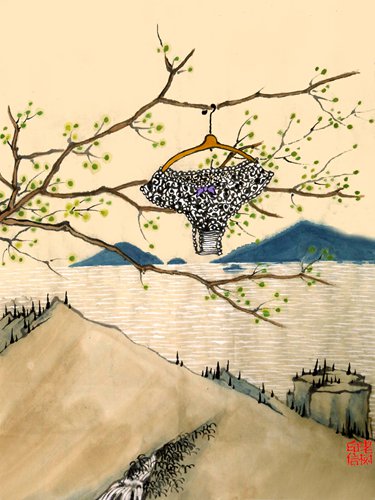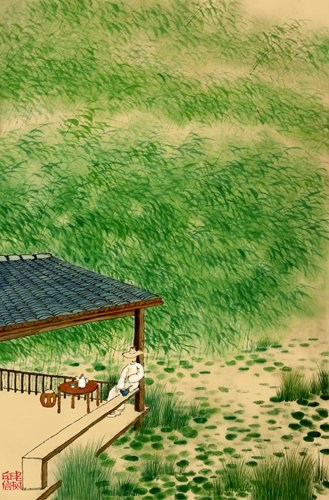

Illustration from Yu Shicun's Book of Time by Chinese artist Lao Shu (Photo/Courtesy of Beijing Tiehulu Books)
China's 24 Solar Terms were everywhere in the media after they were inscribed on UNESCO's List of Intangible Cultural Heritage on November 30, 2016.
While the move was an important one for China, Yu Shicun, a scholar of traditional Chinese culture who released a book on the 24 Solar Terms titled Book of Time on Saturday, says UNESCO's reasons for listing the terms shows a lack of understanding.
"They said the 24 Solar Terms are part of local knowledge and folk culture. I think this somewhat neglects people who live in urban areas," Yu told the Global Times ahead of a book signing on Saturday.
"Actually it's very cosmopolitan knowledge."
Book of Time focuses on explanations of each of the 24 Solar Terms and introduces some of the culture and legends related to them.
Published by Beijing Tiehulu Books for 65 yuan ($9.38), Book of Time has a 9.3/10 on review website Douban as of Tuesday.
"Yu's book points out the biggest problem modern people are facing, which is a lost sense of time," Douban user Bao Muxiao wrote in his review of the book.
The Solar Terms divide a year into 24 roughly two week periods with names that are meant to describe certain annual phenomenon, such as 'Small Snow' and 'Insects Awaken.' In ancient times, they acted as a sort of guide for agricultural activities.
According to Yu, it is difficult to say when the Solar Terms were first used in China, but historians are sure that it had taken its final form by the Han Dynasty (206BC-AD25).
Yu thinks the role of the Solar Terms as a part of agricultural culture has been exaggerated after its induction into the World Heritage List, which has misled people to wrongly think the lives of ancient farmers strictly followed the Solar Terms.
"In fact, there were few people who could fully grasp this knowledge, even ancient Chinese farmers," Yu explained.
"The Solar Terms had long been neglected by the public and mainstream academic circles. There are barely any experts on the Solar Terms in China today," Yu noted.
The Solar Terms do, however, reflect how the lives of ancient Chinese were closely tied to seasonal natural phenomena. By watching this natural phenomena they were able to come up with a system for regulating their lives, which in Yu's own words was an "amazing way to see the world that has been abandoned by modern people."
Ancient Chinese lived their lives closer to nature, according to Yu. In the past people used to get up at dawn, but in today's age that has changed. In Yu's opinion, this divorce from a nature has led to the rise of "urban diseases" such as depression and a dissatisfaction with life.
"Because your biological clock is not fitting in a natural schedule, your body can't bear the stress, which has led to the subpar health of modern people," Yu pointed out, adding that while modern medicine has helped modern people resist these bad conditions, the future is not bright.
Yu points to the rise in pollution in China as another example of how human activities run counter to natural systems.
This rise in pollution in recent years, especially around the winter months, has led many Chinese to joke that 'Big Smog' may just become the 25th Solar Term.
"Smog has definitely became a new seasonal phenomenon," Yu said.


















































